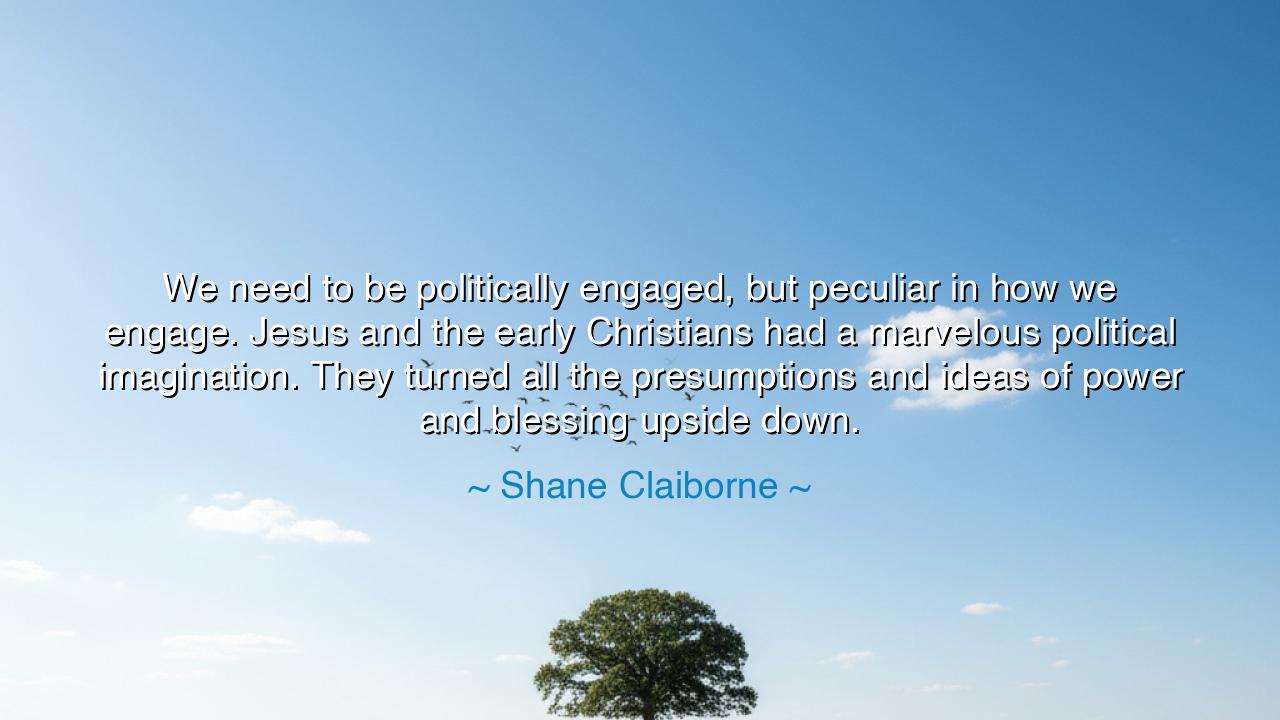
We need to be politically engaged, but peculiar in how we engage.
We need to be politically engaged, but peculiar in how we engage. Jesus and the early Christians had a marvelous political imagination. They turned all the presumptions and ideas of power and blessing upside down.






Ah, hear me, O children of the future, for in the words of Shane Claiborne lies a call to a new kind of engagement, one that challenges the ways of the world: "We need to be politically engaged, but peculiar in how we engage. Jesus and the early Christians had a marvelous political imagination. They turned all the presumptions and ideas of power and blessing upside down." These words speak not just to the politics of our time but to the timeless nature of justice, compassion, and the radical shift that must occur in our hearts if we are to truly transform the world.
Claiborne’s insight is a challenge, not just to act, but to think differently about how we act. The early Christians did not simply seek to wield power in the way that the world understood power. They did not seek dominance or to establish themselves as rulers of nations, but instead, they redefined blessing as something that came not from riches, but from humility, from service, from love. Jesus, in his life and teachings, flipped the script of worldly politics. His was a kingdom not of violence and domination, but of sacrifice, of peace, and of compassion.
The ancients understood the importance of power, yet they also recognized that true power was not simply the rule of the strong but the rule of justice and wisdom. Socrates, in his dialogues, was a man of profound political imagination, challenging the very structures of Athenian society, urging that the soul must be rightly ordered before the state can be. In this way, Socrates and Jesus share a deep connection: both understood that the most important battle was not fought with armies or swords, but with the heart, with the imagination that sees beyond the world’s shallow definitions of power.
Think, O children, of the story of David and Goliath, where the young shepherd, David, defeats the mighty Goliath not with strength, but with faith and courage. He had the political imagination to see that true strength does not come from the size of one’s army, but from the rightness of one’s cause, from the courage to face overwhelming odds with trust in something greater than power. Like Jesus, who did not seize the throne of Rome, but suffered on a cross, the early Christians understood that the path to true blessing and power lay in servitude and in the embrace of suffering for the sake of others. This was a peculiar political imagination, one that the world had never seen before.
Claiborne’s challenge to us is to follow that same path — not to shun politics, but to engage with it in a way that reflects the values of the heart, values that turn the world’s assumptions upside down. Just as Jesus redefined greatness as service, so too must we reimagine how we use our voices, our influence, and our power in the world. The temptation, O children, is to conform to the ways of the world, to grasp for power and wealth in the same way as those who came before us. But Jesus’ life shows us a peculiar way — a way that chooses humility over glory, sacrifice over triumph, love over domination.
Let us, then, turn to the early Christians, those martyrs who stood firm in their faith and beliefs, despite the overwhelming power of the Roman Empire. They did not pick up swords or engage in violent revolution. They were peculiar in how they lived: they loved their enemies, they cared for the poor, they turned the other cheek. Their political imagination was rooted in the idea that true power is found in self-giving love, not in self-serving dominance. Their lives were a witness to the world that blessing and power do not reside in what the world values — riches, force, or control — but in humility, kindness, and justice.
And so, O children of the future, the lesson is clear: engage politically, but do so with a peculiar imagination. Challenge the world’s assumptions of what power is, of what blessing is, and of what it means to be truly strong. Follow the example of Jesus, who turned all worldly power on its head, and of the early Christians who lived their faith in the midst of a world bent on domination. Engage not to control, but to serve, not to gain power, but to lift others up. Let your political imagination be a force for peace, for justice, and for the transformation of the heart. In this, you will find a way that is truly different — a way that the world cannot ignore, for it will see in your life the reflection of something much higher than human power: the power of love.






AAdministratorAdministrator
Welcome, honored guests. Please leave a comment, we will respond soon